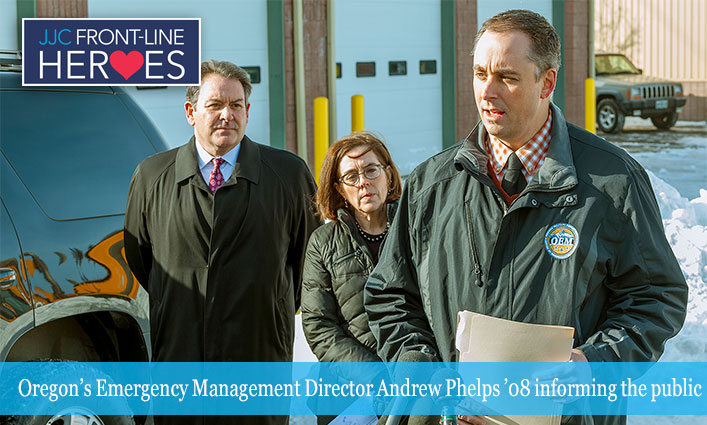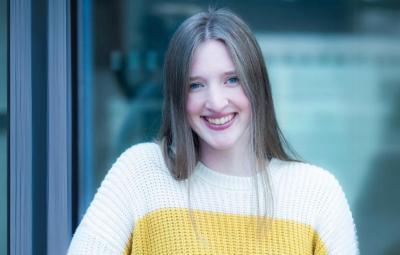
New York City is at the epicenter of the Covid-19 health crisis, and as a New York City-based College that educates students committed to public service, our alumni, students, faculty, and staff are working on the front lines to keep our communities safe. Our “Front-Line Heroes” article series serves as a testament to the valiant efforts of our first responders and essential workers. As a community we thank them for their service, dedication, and personal sacrifice.
As the Director of Oregon’s Office of Emergency Management, Andrew Phelps ’08 leads statewide efforts to prepare for, mitigate against, respond to, and recover from emergencies and disasters, regardless of the cause. “My office also oversees several multi-million-dollar state and federal grant programs and manages the statewide 9-1-1 system,” says Phelps. “I also serve as the Governor’s Authorized Representative for federal disaster declarations.” Amidst the chaos of the Covid-19 crisis, Phelps is making sure that the people of Oregon stay safe and informed.
When did you first start to see and understand that this virus was going to have the impact that it has?
I think the first indication that we would be seeing impacts similar to what had been observed in China was when we had our first confirmed case in Oregon, which was a “community spread” case—meaning the person had no known contact with a previous case or anyone who had traveled to China. But it wasn’t until the NBA canceled games that it really began to sink in how this was going to impact our everyday lives for a long, long time.
What were your first thoughts and concerns when the full scope of the pandemic came to light?
My first thought was to remember the strength of our public health emergency managers, and to lean on them for guidance and recommendations, while also supporting their operations as best as we could. When their capacity began to be exceeded, not long after our first fatality in Oregon, we started to view our response through a more “all-hazards” lens. We all had to be cognizant of the deficiencies in our plans and planning assumptions for a pandemic. We had to look for what was familiar to us—be it logistics missions, planning, and public information/communications—and use those familiar components as navigational aids. This meant that while we would certainly use our plans as guides, we had to navigate from an aid-to-aid standpoint, as opposed to getting stuck in our plans and preconceived ideas of what a response like this should look like.
Now that Covid-19 is acutely affecting our communities, and you’re directly on the front line, what does a typical day look like for you?
Days are really driven by a constant stream of new information, updated numbers or guidance, the need to keep our state’s elected leadership apprised of our response, and ensuring that our team has what they need to be successful, including the appropriate amount of time away from our operations center and spending time with their families. Now, it’s pretty common to have 12- to 14-hour days, and I’ve gotten to the point where it’s easier to step away for a day or two, particularly on weekends.
What do you want our community to know about your experience as a first responder working on the front lines of this global health crisis?
I think one of the most frequent aha moments I’ve seen across state agencies is the realization that during a complex disaster like this pandemic, every agency becomes an emergency-management agency. Many agencies that typically aren't “response oriented” haven’t invested enough time in planning, training, or exercising their role during a disaster plan. There has to be an understanding that when your community—whether it’s a city, a county, a tribe, a corporation, a state, or a nation—has a big event like this, it’s an all-hands-on-deck situation. It’s critical to the success of your community’s response that everyone is ready to perform or lead their team in that environment.

“I firmly believe the best emergency managers don’t know everything, but they have the phone numbers of the people who do.” —Andrew Phelps
How has your education from John Jay helped guide you during this crisis?
John Jay solidified the importance of building relationships outside of your jurisdiction, discipline, or immediate circle. In emergency management, relationships are everything. I firmly believe the best emergency managers don’t know everything, but they have the phone numbers of the people who do. Taking a mostly public administration curriculum at John Jay, I was able to weave emergency management into most of my courses. Whether it was a budget course, and I wrote a paper proposing a budget for a small emergency management agency, or a human resource management course, and I did a project about staffing an emergency operations center. John Jay was a great test ground for finding emergency management principles in most everything we do, especially in the public sector.
How has this global health crisis impacted you on a personal level?
I think we all rely on family and it’s so important to be able to come home to familiar faces after long, stressful days. It can be hard when everyone is asleep when I get home, and still asleep when I have to leave in the morning, but considering how many people are sitting isolated in hospital rooms or don’t have jobs to go to, I feel incredibly lucky. I have a daughter in high school who is a top-notch rugby player and it’s been hard not to be able to see her play games—as the season has been canceled—but she and her friends are finding creative ways to stay physically distant but socially connected. They’re dropping off homemade baked goods on each other’s front steps and leaving art projects in each other’s mailboxes. My son is younger and misses some of our rituals like grocery shopping on weekends and seeing his friends from pre-k, but as a kid who suffers from asthma, his health and safety have been a primary concern. We are all making sacrifices to keep our friends, families, and neighbors safe and it’s important to remind ourselves and each other that this isn’t going to be forever. Honestly, I really don’t like hearing the term “the new normal,” as so many of us are working incredibly hard to prevent this from becoming normal.
“The hardest part of this pandemic is realizing that no matter how hard we work, or how well we do our jobs, people are still going to die from this virus.” —Andrew Phelps
Is there any moment that hit you particularly hard?
I think the hardest part of this pandemic is realizing that no matter how hard we work, or how well we do our jobs, people are still going to die from this virus. As a slowly-evolving disaster, where we are still very much in response mode over a month after our first case, that is extremely frustrating. We’ve also had some challenges with long-term care facilities and that has hit home. My father-in-law spent the last few years in a nursing home, which can be a difficult environment in the best of times. Knowing that there are people in those facilities who will not be able to spend their last moments on earth with family, due to visitor restrictions, is hard to bear.
Have there been any acts of kindness or moments of levity and encouragement that have uplifted you?
Early on, I was working out of our state’s health department’s operations center and I went down to the table where box lunches had been delivered. All of them were from the local sandwich shop and they had mailing labels on them that read: “The reason our community will soon have won is because of you at the State of Oregon. Keep up the great work!” It was so small and simple, but really touched me.
It was also an amazing experience when I was called by our governor about the idea of sending our allocation of ventilators from the Strategic National Stockpile to New York. As an emergency manager, it is never easy to give up a resource you may need to help save lives in your community, but ultimately, we decided things sitting on a shelf in Oregon could save a life across the country within 24 hours. That thought made the decision an easy one to make. Being able to call my counterpart in New York and make that happen has been one of the most rewarding parts of this experience, not just because it was the right thing to do, but because I was able to help my old stomping grounds a bit.
“This pandemic has shown once again that the notion of post-disaster anarchy is indeed a myth. We have a strong desire to take care of each other.” —Andrew Phelps
Thinking forward, what do you hope we do in the future to both prevent and help handle a situation like this?
First, we need to recognize the importance of investing in emergency and public health preparedness. I think across the board we’ve done an incredible job with the emergency management system we’ve invested in, but too many state and local jurisdictions are under-resourced to manage events of this scope, scale, and duration. Secondly, this has really challenged every community, and seemingly with very few exceptions, communities have come together, supported those who are most vulnerable, and generally been good neighbors. There is this constant disaster myth that, when challenged like we are now, society will break down and chaos will reign. This pandemic has shown once again that the notion of post-disaster anarchy is indeed a myth. We have a strong desire to take care of each other.
“Helping to lead our state’s fight against a global pandemic is a little surreal and overwhelming at times, but there’s nothing else I’d rather be doing during this critical point in our history.” —Andrew Phelps
What other thoughts and experiences has this crisis brought to your mind?
As challenging as this event has been, I’m reminded of my experience living in lower Manhattan on 9/11 and watching the second plane hit the towers and both buildings collapse. As horrible as it was to watch those events from just blocks away, the feeling of helplessness and not being able to do anything to help was really frustrating. At that point in my life, I hadn’t even done so much as taken a first aid class. That experience inspired me to study emergency management, become a firefighter, and do some of the other things I’ve been fortunate enough to be able to do, so now I could be in a position to help. This has been a driving force in my life for the last 18 years. Helping to lead our state’s fight against a global pandemic is a little surreal and overwhelming at times, but there’s nothing else I’d rather be doing during this critical point in our history.



